Great Western ‘A32’ a precursor to B-Doubles
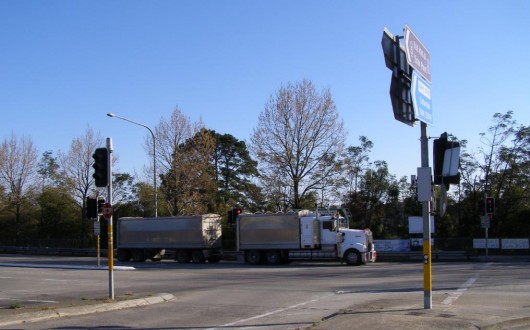 B-Double truck plying the Great Western Highway
New South Wales, Australia
(Photo by Editor 20121005, free in public domain, click image to enlarge)
B-Double truck plying the Great Western Highway
New South Wales, Australia
(Photo by Editor 20121005, free in public domain, click image to enlarge)
.
It’s all about trucks, bigger trucks, more trucks.
.
An Innocuous Announcement
.
The government of the State of New South Wales (NSW) in Australia late last month announced its plans to rename New South Wales’ major roads, highways, freeways and tollways under an alpha-numeric rebranding, akin to the British road numbering system.
Its ‘Alpha Numeric Route Marker Project‘ will affect more than 60 routes across NSW identified for the upgrade at a forecast cost of around $20 million. The delegated agency, the NSW Roads and Maritime Services (the rebranded ‘Roads and Traffic Authority’), is to roll out this new system of highway route numbering between March and December 2013.
 [Source: ‘Have Your Say’, Bang the Table Pty Ltd (ACN 127 001 236)
– a public relations consultancy outsourced by the NSW Government to deal with communities (voters)
[Source: ‘Have Your Say’, Bang the Table Pty Ltd (ACN 127 001 236)
– a public relations consultancy outsourced by the NSW Government to deal with communities (voters)^http://haveyoursay.nsw.gov.au/road-route-markers]
.
The new system will include a combination of letters and numbers between 1 and 99.
- M = ‘Motorway’
- A = ‘Route of National significance’
- B = ‘Route of State significance’
.
Read: >‘RMS-RTA NSW New Road Number System 2013.pdf’ (1.3MB)
.
Renaming roads, so what?.. one may ask.
Well, in the case of the Great Western Highway through the Blue Mountains (formerly called the Western Road) it will lose its historically familiar name and be rebranded the rather clinical and characterless ‘A32‘.
Instead of people travelling along the famous Great Western Highway over the Blue Mountains, they will simply follow the rather nondescript ‘A32‘, which will sound no different to the ‘A31‘ or the ‘A33‘, wherever they are?
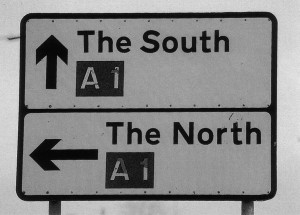 Clinical and characterless trunk routing in the UK
Clinical and characterless trunk routing in the UK
.
Removing the ‘Great Western Highway‘ name will erase its historical meaning to travellers – the oldest highway into inland Australia. The highway journey itself will supplanted by getting from A to B, as fast as possible. The Blue Mountains used to be a destination, but is steadily being transformed into a route from Sydney on the A32 to other destinations further west. So much for the tourism upon which so many Blue Mountains folk so vitally depend.
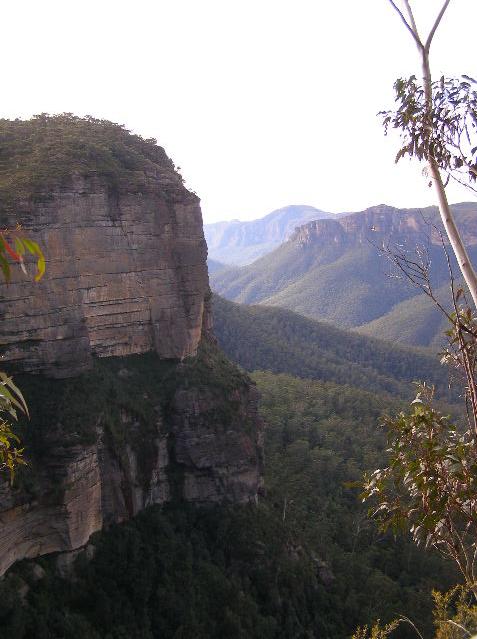 Grose Valley, Blue Mountains
(Photo by Editor 20060625, free in public domain)
Grose Valley, Blue Mountains
(Photo by Editor 20060625, free in public domain)
.
..What Blue Mountains? Where? Oh! Was that them?
.
As the highway is widened and transformed into a trucking expressway, the Blue Mountains from the highway is looking urban just like Sydney. The Blue Mountains as a destination is steadly fading into another fast transit route into and out of Sydney, like the F3.
It is quite contradictory for the NSW Roads Minister, Duncan Gay, to promise that the road routes will retain their regular name, along with their new alpha-numeric designation. Why spend $20 million to rebrand the regular road naming with alpha-numeric road naming, only to retain the regular naming? The current road naming already displays the route number, as evidenced by the Route ‘32‘ symbol on the current Great Western Highway sign below. So why change it?
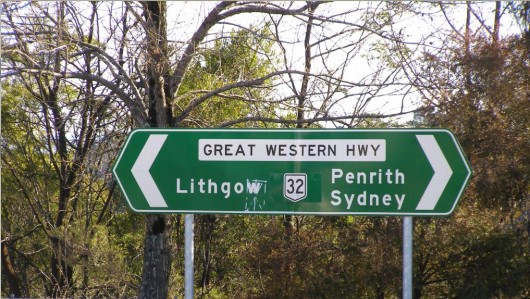 Great Western Highway across the Blue Mountains
(National Trucking Route 32)
(Photo by Editor 20121005, free in public domain)
Great Western Highway across the Blue Mountains
(National Trucking Route 32)
(Photo by Editor 20121005, free in public domain)
.
But the alpha numeric road renaming is clearly more than just renaming. It is ‘road rebranding‘ as a first phase of the government’s ‘road reclassification‘ strategy. It is one thing to upgrade a regional highway like the Great Western Highway; it is quite blue sky to reclassify it into a ‘Route of National Significance‘.
The alpha numeric road renaming is a precursor to reclassifying the Great Western Highway as an ‘A’ grade route of national significance, which is what the Hume Freeway is. Reclassification sets the precedent for the highway over the Mountains to bve upgraded to the likes of the Hume, if goivernmenyt so wishes. Both will be deemed A’ grade routes of national significance. It is a one size fits all approach from the urbane big brother in Macquarie Street.
This announced road renaming will follow a policy trend interstate in Queensland, Victoria and South Australia and so will be consistent with these adjoining states. NSW will mirror the road numbering system in Britain which has established ‘trunk roads‘ as designated long distance trucking routes interconnecting cities, ports and airports.
This road rebranding is about facilitating national trucking linehaul across state borders. It is all about encouraging more road freight across the country. For line-haul trucking, the aim is getting from A to B, as fast as possible. The slower the road journey, the higher the freight cost.
 British Motorways: conceived, designed and built principly for road freight
[Source: ‘FTA man joins DfT for lorry charge development’, 20121004, by Chris Tindall, ^http://www.commercialmotor.com/latest-news/fta-s-ch, accessed 20121005]
British Motorways: conceived, designed and built principly for road freight
[Source: ‘FTA man joins DfT for lorry charge development’, 20121004, by Chris Tindall, ^http://www.commercialmotor.com/latest-news/fta-s-ch, accessed 20121005]
.
But the NSW Government’s official selling point is that its alpha numeric road rebranding is all so that motorists have “a better way to navigate NSW roads”. “It will be a more intuitive way for road users to navigate around NSW. These changes will help simplify journeys, making them safe, efficient and enjoyable.”
[Sources: ‘Road Route Markers’, New South Wales Government, ^http://haveyoursay.nsw.gov.au/road-route-markers, ; ‘Highway A1 – Waterfall Way B78 Save’, by Greg McLagan, 20121001, ^http://www.bellingencourier.com.au/story/368457/highway-a1-waterfall-way-b78/?cs=483, accessed 20121005].
The Spin
.
According to the RTA-RMS, the upgrade of the Great Western Highway is to ‘improve road safety’, ‘improve road freight efficiency’, ‘cater for the mix of through, local and tourist traffic and ‘be sensitive to the area’s natural environment, heritage and local communities.’ [Source: ^http://www.rta.nsw.gov.au/roadprojects/projects/great_western_hway/index.html]
However, one suspects given the RTA-RMS’s arrogant track record of its expressway bulldozing through roadside vegetation and local communities, that the primary mission is one-eyed to ‘improve road freight efficiency’. The other aims are merely for RTA-RMS public relations tricky appeasement, freeing up the expressway engineers to proceed business-as-usual.
 Great Western Highway bulldozed out to four lanes at Katoomba
(Photo by The Habitat Advocate 20090501, free in public domain)
Great Western Highway bulldozed out to four lanes at Katoomba
(Photo by The Habitat Advocate 20090501, free in public domain)
.
The NSW Government persuasive language is that the alpha numeric rebranding is to ‘standardise the system’, to end the confusion between states, to identify road corridors ‘in order of their importance‘ and so ‘make it easier for motorists to know if they are travelling on a motorway or a route of national or state significance as they plan their trip.’ In any case the Government’s additional quip is that well road signs in NSW have not been reviewed for 30 years, so that is a valid reason to do so.
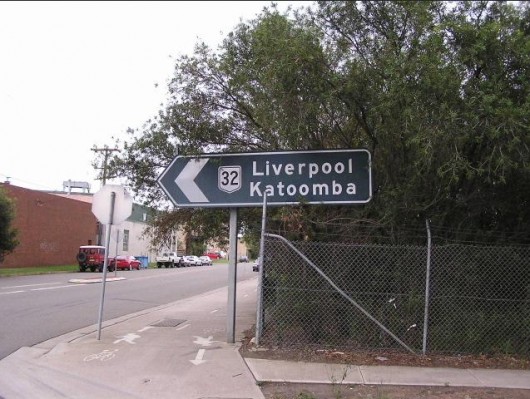 Trunk Route 32 starts from industrial areas and is designed purely to route trucking
The Route numbering designation has nothing to do with ordinary motorists; such association is political spin.
Trunk Route 32 starts from industrial areas and is designed purely to route trucking
The Route numbering designation has nothing to do with ordinary motorists; such association is political spin.
.
But why do ordinary motorists need to know whether a road has national or state significance? The route numbers are already there on the current road signs across the State.
The NSW Opposition has dismissed this project as a ‘colossal waste of money that won’t save motorists a single minute in travel time or improve road conditions and safety.’ At the same time the NSW Opposition claims ‘motorists of this State want new roads, less congestion and better road conditions..‘ [Source: ‘New road names a colossal waste of money’, 20120927, by John Robertson, Robert Furolo, ^http://www.nswalp.com/media/news/new-road-names-a-colossal-waste-of-money/]
.
Alpha-Numeric Renaming – a precursor to more Trucking Expressways
.
Could there indeed be another reason for embarking on a $20 million road rebranding project? Is the rebranding in fact a precursor to legislating for B-double trucks to ply regional roads where they are currently prohibited?
It is one thing to upgrade a regional highway like the Great Western Highway; it is quite ‘blue sky’ to reclassifying a regional highway like the Great Western Highway into a ‘Route of National Significance‘.
.
Ed:
This road re-branding is a ‘one-size-fits-all’ edict for uniformity. It serves to abet trucking lobbyists, to befit centralist bureaucrats, while de-personalising local communities in the process. It is a strategic precursor to rolling out more Trucking Expressways. It reeks of rancid Babyboomerism – the self-entitlement, the moral relativism, the utilitarianism, oil-dependent industries…all cultural throwbacks to the exploitative 20th Century. Die off, history beckons!
.
Such reclassification facilitates central government roughshodding of legitimate local community concerns about the adverse and permanent impacts. When the RTA-RMS wants to bulldoze its trucking expressways through local communities, the legal reclassification overrides concerns about the impacts on environment, amenity, land values, equity and access. It is a prejudiced arrogant policy undermining local democratic rights.
The scheme is inherited from the recent NSW Government centralist planning policy that designated projects of State Significance and Projects of National Signifiance. In 2005, the NSW Government conceived its autocratic State Environmental Planning Policy (Major Projects) then in March 2006 imposed its ‘NSW Major Projects Assessment System‘ upon the people of NSW. It was all to ‘remove unnecessary red tape’, ‘clarify the assessment of major projects’, and ‘help NSW remain Australia’s economic powerhouse.’ [Ed: Sometimes spin can be so poetic]
It became known as Part 3A – a new part of the Environmental Planning and Assessment Act 1979 (EP&A Act) that simply overruled all other parts. Easy!
Under this planning policy and amended planning legislation, if the NSW Government deemed an infrastructure project to be of ‘State Significance’, then local council objections would be automatically overruled and community protests discarded. The State’s Planning Minister would have ultimate say supposedly in the State’s interest to allow the project to proceed and to roughshod all social impacts and all environmental impacts. It was a return to autocracy, just like in the days of kings and queens ruling over serfs and peasants.
[Read more about the ‘NSW Major Projects Assessment System‘, ^http://www.planning.nsw.gov.au/assessingdev/pdf/part3a_communityguide.pdf, Accessed 20121005, >Read the Guide (1.4MB)].
But now for a road to be deemed a ‘Route of National Significance’ (i.e. get the ‘A’ branding), well, local communities will have even less of a voice.
The policy is absolute Putinesk (neo-‘Stalinist’).
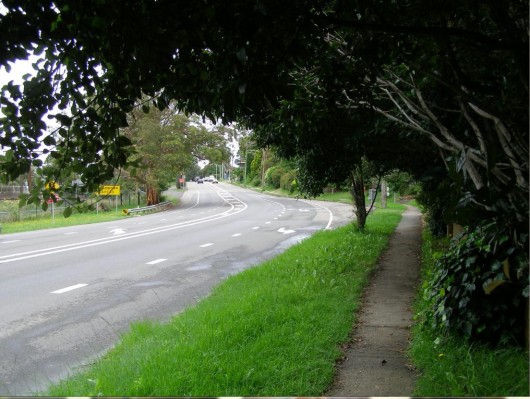 Goodbye Bullaburra – set to be the next victim of the Trucking Expressway
(Photo by Editor 20120103, free in public domain, this is a photo for the historical record)
Goodbye Bullaburra – set to be the next victim of the Trucking Expressway
(Photo by Editor 20120103, free in public domain, this is a photo for the historical record)
.
This alpha numeric road renaming is ‘road rebranding‘ and the first phase of the government’s ‘road reclassification‘ strategy. It is part of a broader road centric freight agenda that ignores the demonstrable long-term and future-resilient benefits of rail freight nationally.
Reclassifying the Great Western Highway into the A32 Road of National Significance achieves more than upgrading the regional highway to a four-lane trucking expressway, all so that thousands of B-doubles can nudge 90kph on cruise control. The Road of National Significance is national trucking route policy. It will see the 1950’s conceived National Route 32 from Sydney 1154km to Cockburn on the South Australian Border and extend well beyond to Adelaide, Perth and Darwin.
It is 1950s mindset applied in 2013. It is all about facilitating interstate freight by 25 metre long B-Double trucks.
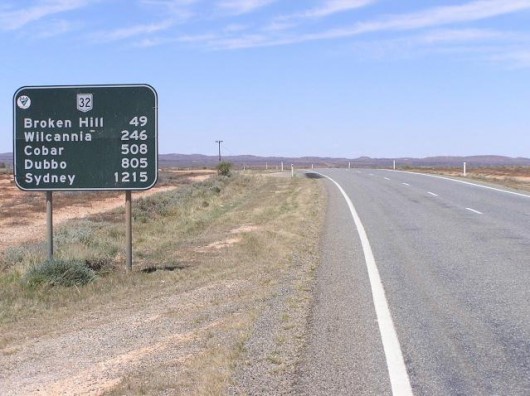 Trunk Route 32, somewhat further west
Trunk Route 32, somewhat further westThe distance sign heading east from the NSW/SA Border at Cockburn This is now the western terminus of National Route 32 following the implementation of alpha-numeric route marking in South Australia, Jan 2005. [Source: ^http://www.ozroads.com.au/NSW/RouteNumbering/National%20Routes/32/nr32.htm]
.
Meanwhile, hectare after hectare of Blue Mountains native vegetation is bulldozed to make way for the ‘Trucking Expressway‘.
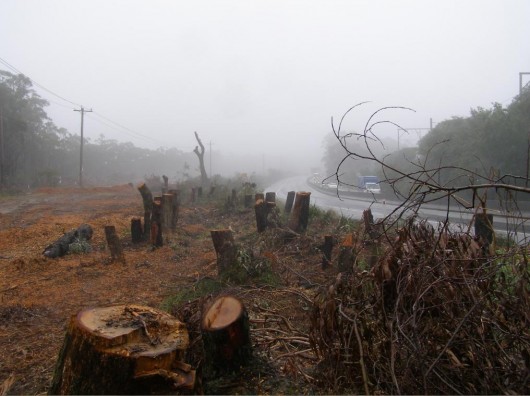 Wentworth Falls bushland amenity disappearing for the Trucking Expressway
Wentworth Falls bushland amenity disappearing for the Trucking Expressway(Photo by Editor 20120201, free in pubic domain, click image to enlarge)
.
Meanwhile, Australian wildlife slaughtered as roadkill is perpetuated and ignored by the RTA-RMS to make way for the ‘Trucking Expressway‘.
Meanwhile, just because the road is wider and faster, humans are not exempt from becoming ‘roadkill’ either.
All we need do is look at Britain, its road-freight centric policy and its consequential trucking carnage legacy.
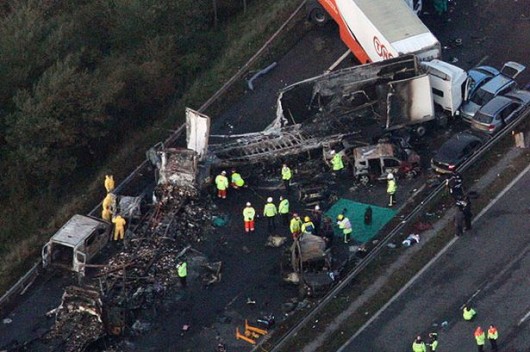 Britain’s M5 truck crash near Taunton, Somerset, November 2011
[Source: ‘M5 crash investigation could go on into the new year’, Mirror (UK),
^http://www.mirror.co.uk/news/uk-news/m5-crash-investigation-could-go-276941
Photo by SWNS]
Britain’s M5 truck crash near Taunton, Somerset, November 2011
[Source: ‘M5 crash investigation could go on into the new year’, Mirror (UK),
^http://www.mirror.co.uk/news/uk-news/m5-crash-investigation-could-go-276941
Photo by SWNS]
.
Trucking Expressways kill local communities in more ways than one
.
Meanwhile, the ongoing trucking carnage legacy continues along already upgraded sections of the Great Western Highway:
[Source: “Frightening” figures released’, by journalist Krystyna Pollard, 20110914, Blue Mountains Gazette (newspaper), p.7].
 [Source: ‘Gone too soon’, by journalist Damien Madigan, 20110914, Blue Mountains Gazette (newspaper), p.1]
[Source: ‘Gone too soon’, by journalist Damien Madigan, 20110914, Blue Mountains Gazette (newspaper), p.1]
.
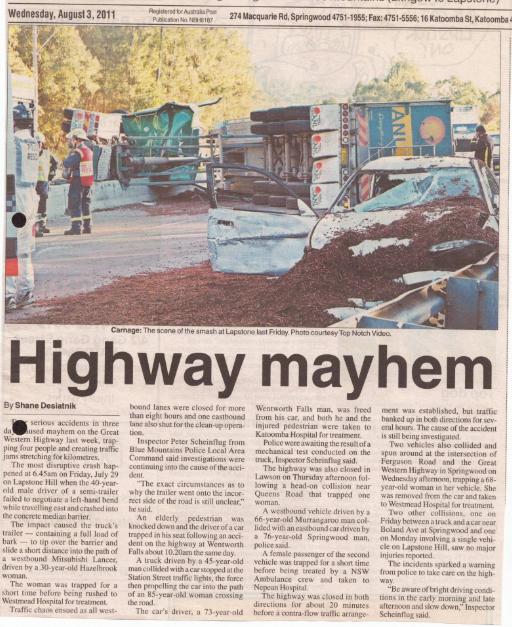 [Source: ‘Highway mayhem’, by journalist Shane Desiatnik, 20110803, Blue Mountains Gazette (newspaper), p.1]
[Source: ‘Highway mayhem’, by journalist Shane Desiatnik, 20110803, Blue Mountains Gazette (newspaper), p.1]
.
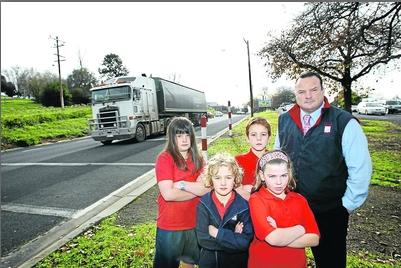 Linehaul Trucking and pedestrians don’t mix
Trucking Economics does not overrule!
[Source: Blue Mountains Gazette (newspaper]
Linehaul Trucking and pedestrians don’t mix
Trucking Economics does not overrule!
[Source: Blue Mountains Gazette (newspaper]
.
 Speeding B-Double overturned at Lapstone on an already widened 4-laned section of the converted Trucking Expressway
[Source Blue Mountains Gazette, 20110729]
.
Speeding B-Double overturned at Lapstone on an already widened 4-laned section of the converted Trucking Expressway
[Source Blue Mountains Gazette, 20110729]
.
What is preventing B-Triples bidding for access to Roads of National Significance?
They already allow them interstate.
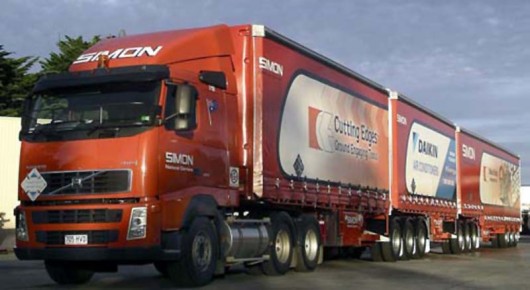 They used to be called ‘Road Trains‘
B-Triples up to 36.5 metres long have been operating in South Australia under permit on a restricted route network for a number of years.
[Source: Gazetted Operation of B-Triples in South Australia,
^http://www.transport.sa.gov.au/pdfs/freight/09_11_update/B_Triple_Information_Bulletin_Oct_2011.pdf , Accessed 20121005 >Read Bulletin (30kb)]
They used to be called ‘Road Trains‘
B-Triples up to 36.5 metres long have been operating in South Australia under permit on a restricted route network for a number of years.
[Source: Gazetted Operation of B-Triples in South Australia,
^http://www.transport.sa.gov.au/pdfs/freight/09_11_update/B_Triple_Information_Bulletin_Oct_2011.pdf , Accessed 20121005 >Read Bulletin (30kb)]
.
.
The ‘Trucking Expressway‘ vision for the Great Western Highway ‘A32’:
.
>More articles on ‘Threats from Roadmaking’.
.
Tags: Alpha Numeric Route Marker Project, Blue Mountains, Great Western Highway, Motorway, NSW Government, Route of National significance, Route of State significance, RTA Blue Mountains, trucking expressway
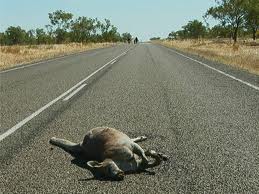
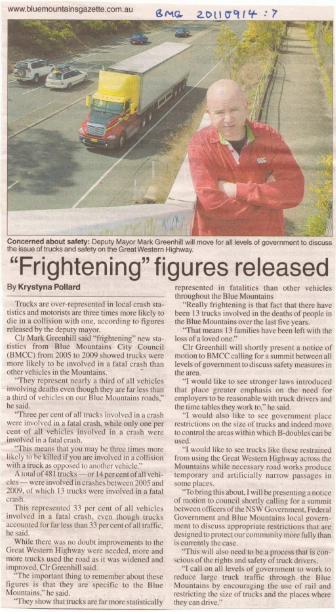
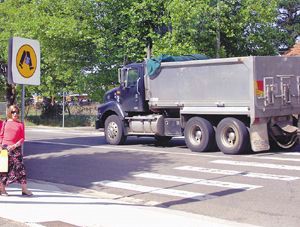
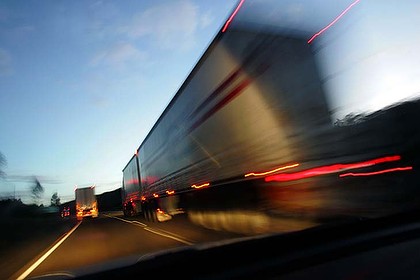


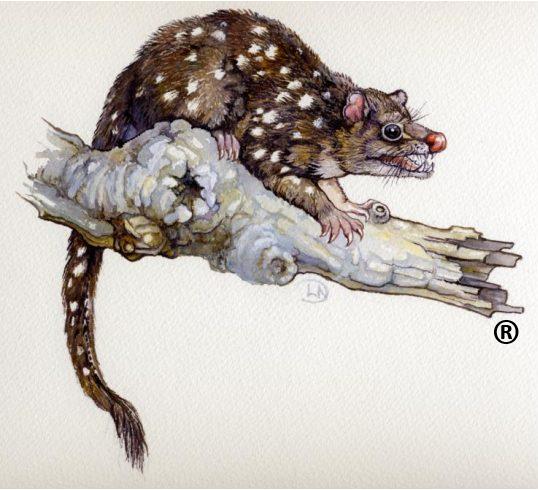
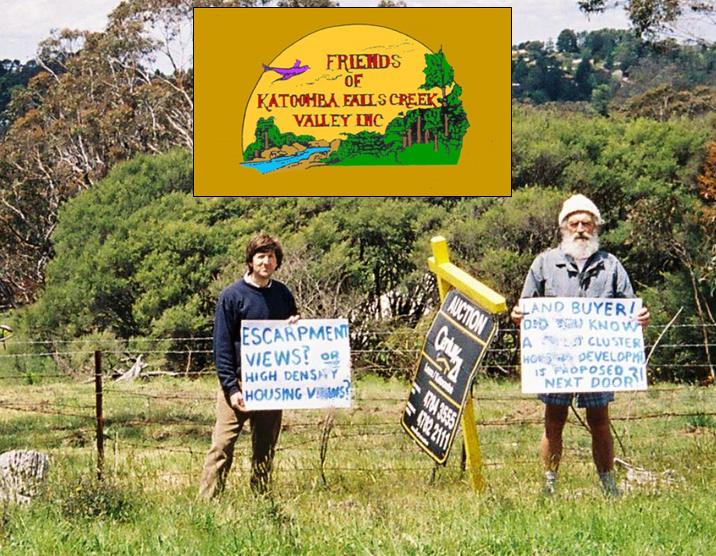

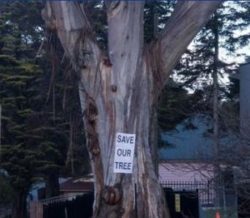
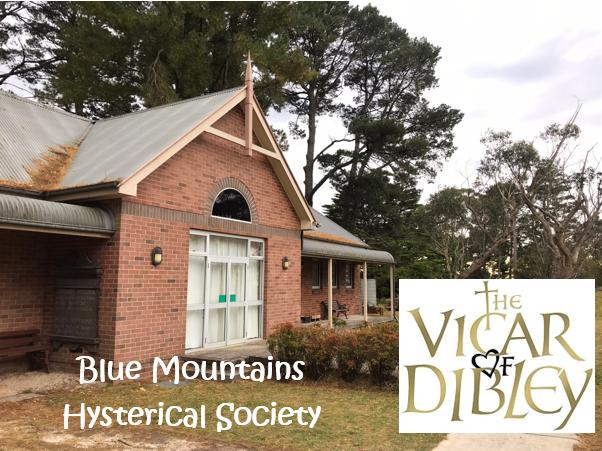



This is absolute madness! It happens in Bendigo as well – 500 year old gum trees have to give way to roads. (For ecological impacts of roads and road effect zones see Nicholas S.G. Williams et al – “The Potential Impact of Freeways on Native grassland”; The Victorian Naturalist, vol. 118 (1) 2001,
pp. 4-15)
The trend in road freights to bigger and bigger trucks and longer road trains shows clearly that rail freight is far more efficient than road freight and of course it is also far less environmentally damaging.
So the money could have been far better spent on upgrading railways if transport efficiency and environmental impact were taken into consideration.
Unfortunately environmental considerations are excluded from our economy driven decision processes, but the likely losses of capital invested by the trucking and road building companies in their trucks road building machinery are not. Thus such decision processes will inevitably favour road over rail freight. That is why, as pointed out in this article, the government is taking steps to “override local community concerns about impacts on environment, amenity, land values, equity and access”
The environmental vandalism that will follow from this reclassification of roads is just the beginning of what lies is store if the Council of Australia Governments’ currently proposed plan to change the federal and state environmental laws will be allowed to go ahead (for details see “Defend Environmental Laws” on http://www.edovic.org.au).